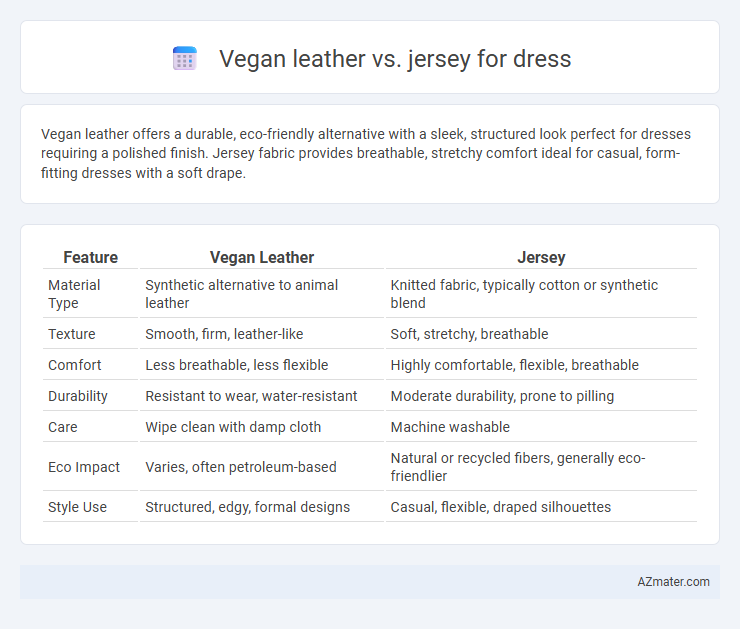Vegan leather offers a durable, eco-friendly alternative with a sleek, structured look perfect for dresses requiring a polished finish. Jersey fabric provides breathable, stretchy comfort ideal for casual, form-fitting dresses with a soft drape.
Table of Comparison
| Feature | Vegan Leather | Jersey |
|---|---|---|
| Material Type | Synthetic alternative to animal leather | Knitted fabric, typically cotton or synthetic blend |
| Texture | Smooth, firm, leather-like | Soft, stretchy, breathable |
| Comfort | Less breathable, less flexible | Highly comfortable, flexible, breathable |
| Durability | Resistant to wear, water-resistant | Moderate durability, prone to pilling |
| Care | Wipe clean with damp cloth | Machine washable |
| Eco Impact | Varies, often petroleum-based | Natural or recycled fibers, generally eco-friendlier |
| Style Use | Structured, edgy, formal designs | Casual, flexible, draped silhouettes |
Introduction: Vegan Leather vs Jersey for Dresses
Vegan leather offers a sleek, textured finish that mimics traditional leather, providing durability and a modern edge to dresses. Jersey fabric delivers exceptional stretch and breathability, making it ideal for comfortable, form-fitting styles. Choosing between vegan leather and jersey depends on the desired aesthetic and wearability, with vegan leather excelling in structured designs and jersey favored for casual, flexible garments.
Fabric Composition and Origins
Vegan leather, typically made from polyurethane or plant-based materials like pineapple leaves and apple peels, offers a durable, animal-free alternative to traditional leather sourced from animal hides. Jersey fabric, composed primarily of cotton, polyester, or a blend of synthetic fibers, originated from the island of Jersey, renowned for its soft, stretchy knit ideal for comfortable, breathable dresses. Both fabrics support ethical fashion but differ dramatically in texture, sustainability profiles, and production methods, making material choice critical based on dress design and wear preferences.
Sustainability and Environmental Impact
Vegan leather, often made from polyurethane or plant-based materials like pineapple leaves or cactus, offers a sustainable alternative to traditional leather by reducing animal cruelty and lowering carbon emissions, but its plastic components can contribute to microplastic pollution. Jersey fabric, typically composed of cotton or bamboo, provides an eco-friendly option due to its biodegradable fibers and low water usage when organically sourced, though conventionally grown cotton can have a high environmental footprint. Choosing sustainably produced vegan leather and organic jersey enhances dress sustainability by minimizing resource consumption and environmental degradation.
Comfort and Wearability
Vegan leather offers a stylish, durable option for dresses but tends to be less breathable and flexible than jersey, potentially impacting comfort during extended wear. Jersey fabric provides excellent softness, stretchability, and moisture-wicking properties, making it highly comfortable and ideal for everyday or casual dresses. When prioritizing wearability, jersey allows for greater ease of movement and temperature regulation, while vegan leather excels in appearance but may require more care to prevent stiffness and discomfort.
Texture, Look, and Style
Vegan leather offers a smooth, sleek texture with a polished look that enhances sophisticated and edgy dress styles. Jersey fabric provides a soft, breathable texture with a matte finish, ideal for casual and flowing dress designs. The choice between vegan leather and jersey greatly influences the dress's overall aesthetic, balancing structured elegance with comfortable versatility.
Durability and Maintenance
Vegan leather offers superior durability compared to jersey for dresses, resisting scratches and wear while maintaining its shape over time. It requires minimal maintenance, often only needing a simple wipe with a damp cloth to stay clean and in good condition. Jersey, while comfortable and breathable, tends to stretch and pill with frequent use, demanding more frequent washing and gentle care to preserve its longevity.
Ethical Considerations
Vegan leather offers an ethical advantage over traditional leather by eliminating animal cruelty and reducing greenhouse gas emissions associated with livestock farming. Jersey fabric, often made from organic cotton or recycled materials, emphasizes sustainability through biodegradability and lower water consumption during production. Choosing dress materials depends on prioritizing animal welfare and overall environmental impact, with both vegan leather and eco-friendly jersey presenting more responsible options than conventional textiles.
Cost Comparison
Vegan leather dresses typically have higher upfront costs compared to jersey dresses due to the synthetic materials and production processes involved, often ranging from $50 to $150 per garment. Jersey fabric, made from cotton or synthetic blends, is generally more affordable, with prices commonly between $20 and $60, making it a budget-friendly option for casual and everyday wear. When factoring in durability and care expenses, vegan leather may incur additional costs over time, whereas jersey provides cost-effective maintenance and replacement.
Popular Fashion Trends and Designers
Vegan leather and jersey fabrics dominate contemporary dress designs, with popular fashion trends highlighting sustainability and comfort. Designers like Stella McCartney and Gabriela Hearst frequently incorporate vegan leather to create edgy, eco-friendly styles, while brands such as Jacquemus and Telfar emphasize jersey for its versatility and breathable texture. The fusion of these materials reflects the growing demand for innovative, ethically produced fashion that balances structure and softness.
Choosing the Right Fabric for Your Dress
Vegan leather offers a sleek, durable finish ideal for structured dresses, providing a modern, edgy look while being animal-friendly. Jersey fabric is soft, breathable, and highly flexible, perfect for comfortable, form-fitting dresses that drape naturally. Choosing between vegan leather and jersey depends on desired style, comfort, and occasion, with vegan leather suited for statement pieces and jersey for everyday wear.

Infographic: Vegan leather vs Jersey for Dress
 azmater.com
azmater.com